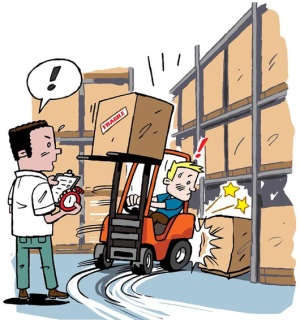Complete Powerpoint slide presentation for forklift instructors. Ready made training course
The right truck for the right application
 It may seem like an obvious statement, but getting the right truck can make a world of difference to your operation. This article by Mitsubishi Forklifts describes some of the options available.
It may seem like an obvious statement, but getting the right truck can make a world of difference to your operation. This article by Mitsubishi Forklifts describes some of the options available.
Materials handling is complex work, and there’s no one-size-fits-all solution for every business. Every workplace will have its own individual needs, its own individual challenges, and its own individual standards. It’s fair to say that some trucks are all-rounder's and some are specialists. The right mix of trucks will be making your workplace more efficient, productive, and safer.
Businesses may opt for a fleet of all-rounders that can do all the parts fairly well. For some, that will be a perfectly valid approach, especially when truck utilization is relative low or when there are only a few peaks during the day when the lift trucks are needed.
An advantage of running a fleet with, for example, only counterbalance trucks requires less driver training than an operation with high level order pickers. Also, less operators would be qualified to drive the specialist machines.
But an all-rounder isn’t always the best choice for everyone and making sure you have the best truck for the job can make a tremendous impact.
If floor space is at an absolute premium then you may want to utilise higher racking in combination with reach trucks. If forklifts are regularly driving in and out of lorries then a model with a lower mast or a free lift feature would be more suitable.
You may have to consider the specific roles your staff are doing and look at whether they could also use a simple pedestrian pallet truck. If your forklift has a low utilization rate, then consider a stacker instead, depending on the load weight and beam heights.
Waterproofing, suitability for clean environments such as food preparation, tight turning circles — there are hundreds of features or characteristics that could make a truck more suitable to the work being undertaken.
With margins increasingly tight in highly competitive industries, operators are often under a lot of time pressure in their job, and giving them the correct tools can help in reducing accidents, improving productivity, and countless other benefits
From power pallets and multi-way reach trucks to order pickers and stackers. Rising platforms, scissor lifts, cold cabins — if you have specific requirements, talk to your supplier about exactly what you need.
When it comes to replacing trucks or expanding your fleet, take it as an opportunity to revaluate your requirements or warehouse lay-out. See if you can utilise specialist trucks for specific jobs and make your operator’s lives easier and their work more efficient.
Think of it as the difference between a business suit and a dinner suit. They both do the same job, and in a lot of cases you’d opt for the former as it’s far more versatile and works in a variety of situations. Sometimes though the occasion calls for a dinner suit and nothing else will do.
Conclusion
Make sure the fleet you have is the best fit it can be for a specific task. There is such a wide choice of models for all sorts of applications that you may find that optimising your setup is easier than you’d think, with every part fitting perfectly.
- Action points
- Look at your operations or warehouse set-up with fresh eyes. If you were building the fleet from scratch, is there a different approach you would take?
- Contact a dealer to discuss your flow of goods and see if you need to adapt your fleet.
NOTE: I have written an article on buying second hand trucks using information originally supplied by Mitsubishi. This is located here.
Disclaimer. The legislative information contained on this web site is my interpretation of the law based on many years in the health and safety business. A definitive interpretation can only be given by the courts. I will therefore not be held responsible for any accident/incident/prosecution arising as a consequence of anyone using any information obtained from this web site.